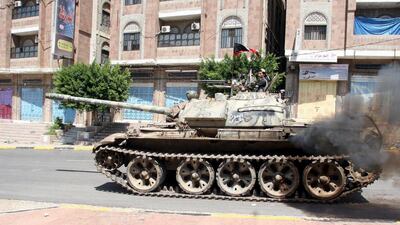ADEN // Fierce fighting raged on Friday around Yemen’s western city of Taez as shelling by Houthi rebels led more residents to take up arms.
In the past two days, 71 people have been killed in fighting between pro-government forces and the rebels, who are allied with Yemen’s former president Ali Abdullah Saleh.
Yemeni security officials said on Friday that of those killed, 11 were civilians and the rest were fighters from both sides.
While Taez city is held by pro-government forces, parts of Taez province are under the control of the rebels. The Houthis have besieged the city and refused to allow in sufficient humanitarian aid.
The UN Office of the High Commissioner for Human Rights said in a statement on Friday that checkpoints run by fighters affiliated with the Houthis are exacerbating “the rapidly deteriorating humanitarian situation” in Taez. They are limiting the movement of civilians and blocking supply routes from the capital Sanaa, the port city of Aden and other parts of Yemen, the UN said.
Civilians and traders are being stopped from transporting essential goods into Taez, including water, fruit and vegetables, the UN said, adding that the price of water has soared by 300 per cent in the past week. The health system in Taez is at “near collapse” and small private hospitals “have been overwhelmed with casualties by the fighting,” the UN said.
The Houthi attacks have caused more Taez residents to join the armed resistance.
Hadi Al Homaid, 28, a former automotive mechanic, closed his workshop in May after fierce clashes broke out in Taez city.
"When I saw the shelling of the Houthis target the civilians in my neighbourhood ... I could not remain at my home waiting for the Houthis' shelling to kill me and I decided to join the resistance," he told The National.
Mr Al Homaid said that he and others from his area had contacted pro-government fighters, who brought them to their headquarters in Al Roudha district. They were accepted as fighters, but still need to receive training.
The leader of pro-government forces in Taez, Moa’ath Al Yaseri, said there are many residents who want to join the fight against the Houthis.
“The Houthis think that they will scare the residents of Taez by their shelling, [but] the shelling encourages residents to join the resistance as they believe that the Houthis will not leave Taez by negotiations but by force,” he said.
The Yemeni presidency said that the liberation of Taez city is one of the main priorities of Abdrabu Mansur Hadi’s government.
Pro-government forces, backed by a Saudi Arabia-led coalition that includes the UAE, have been fighting the rebels in other areas of the province.
Meanwhile, the governor of a province liberated by pro-government forces and coalition troops announced a list of the local government’s requests to the coalition.
In an interview with Al Ittihad, Arabic-language sister newspaper of The National, Sultan Al Arada, governor of Marib, said the province's urgent needs were included on the list, particularly those in the areas of education, health and security. He said he wanted to ensure the rehabilitation of facilities largely damaged by the rebels.
Mr Al Arada added that field assessments of hospitals, schools and security centres were being conducted under the supervision of Emirati cadres, and that promises had been made to rebuild damaged facilities.
He praised the role played by coalition forces in restoring hope to the people of Marib, and said that life had returned to the province after months of terror, worry and fear felt by those living in areas previously occupied by the Houthis.
Also on Friday, coalition air strikes hit a Houthi-held security administration building in Ibb province, killing at least seven rebels and destroying weapon supplies, security officials there said. In Bayda province, six Houthis were killed in an airstrike that hit a rebel camp.
In Sanaa, a villa belonging to Ali Mohsin Al Ahmar, a military adviser to Yemen’s government, was bombed. Mr Al Ahmar is currently in Riyadh and his home may have been taken over by rebel forces.
The UAE also announced the death of a soldier wounded during fighting in Marib in September. Humood Al Ameri died while receiving medical care at a hospital in Germany, the state-run Wam news agency reported.
Rebel forces took over Sanaa in September 2014, forcing the internationally recognised government into exile earlier this year.
The UN says at least 2,577 civilians were killed since March, while 5,078 have been injured.
On Friday, the U.N. special envoy for Yemen said he will start work immediately with the country’s feuding parties on an agenda, date and format for peace talks.
Ismail Ould Cheikh Ahmed confirmed to the UN Security Council that Yemen’s government and rebels have agreed to send delegations to the talks to negotiate an end to the conflict.
He said both sides accepted a security council resolution approved in April that requires the rebels to withdraw from all areas they control and lay down arms captured in months of fighting, though he added that the Houthis are committed to “a negotiated withdrawal from Yemen’s key cities.”
Previous attempts at peace talks have failed, with the Houthis resisting calls to withdraw from all areas they control.
foreign.desk@thenational.ae
* with additional reporting by Associated Press and Agence France-Presse

